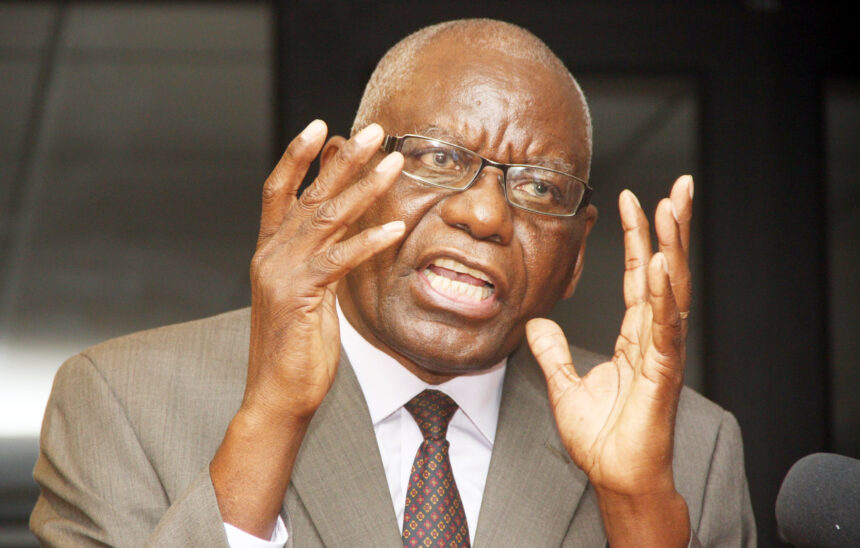Rudolf Gaiseb
The boy-child is falling behind.
Namibia has attempted to level the playing field, promoting equal opportunities and the empowerment of all.
Deliberate actions were taken to ensure women had equal opportunities with their male counterparts.
But while the nation solved one problem, another surfaced.
This is a view held by many, including First Gentleman Lieutenant-General (Rtd) Epafras Denga Ndaitwah, Prime Minister Elijah Ngurare, and former National Assembly Speaker, Peter Katjavivi. Ndaitwah said males and females should move together and balance each other, and one does not need to fall while the other is rising.
He started the boy-child talk last Tuesday during a motivational speech at Triumphant College.
“We must move in that direction so that our children have the same understanding in and outside class. We should do the same and give the same to these people, who will at one time live as a family. We should redefine ourselves. Where do we stand, and how do we move forward?” he asked at the time.
He believes if boys and girls are not equally educated, society is doing a disservice to future families.
At the same time, Ndaitwah said his office, whose programmes are not sponsored by the government, is open to financial support and contributions to implement programmes which will address issues pertaining to the boy- child.
Meanwhile, Ngurare said in this period, multiple programmes have been launched to nurture and empower the girl-child, who was previously excluded from the development process.
This has resulted in the successful upliftment of the girl-child but has, in the process and as an unintended consequence, left the boy-child behind.
He emphasised that the boy-child, too, is just a child who needs love, care and support to discover his true potential and to impact society positively.
“We have a society which speaks of gender equality. We also have a society in which females perform the roles of providers and protectors of their families in single-mother households. We have a society in which the girl- child has overtaken the boy-child in terms of education, employment and leadership roles,” Ngurare said in a speech read on his behalf at the ‘Re-Defining Manhood’ book launch at the Namibia University of Science and Technology (Nust) last Friday.
He expressed awareness of the change in current gender responsibilities in Namibian society.
“This change has caused great consternation and, in many instances, resulted in a loss of identity by the boy-child. Hence, we are witnessing increasing cases of the boy-child engaging in destructive activities such as drug and alcohol abuse, crime, suicide and many others,” he underlined.
Prof Katjavivi asserted that traditional values and roles which have defined manhood for generations are being challenged and redefined, leaving many to question what it truly means to be a man today.
“The profound impact that strong male leadership can have on families and communities and the importance of a father, a brother, a mentor or figures who embody integrity, responsibility and humility cannot be overstated. We are witnessing a troubling trend, a decline in these essential qualities among men, often exacerbated by societal dynamics that have left many feeling adrift,” he stated.
“We need men who can stand out and serve society, reflect shortcomings, and provide leadership; a leadership that is inclusive and not one-sided,” he added.
Dropouts
Eunice Smith, head of the office of the United Nations Educational, Scientific and Cultural Organisation (UNESCO) to Namibia, highlighted that Namibia is experiencing a worrying trend of increased male school dropouts, with boys disengaging from secondary and tertiary education.
“The disengagement of boys from education not only widens gender disparities, but also threatens Namibia’s long-term stability. Our society needs educated men and women who can take up different roles and participate in the political, socio-cultural and economic life of their families, communities, the nation and the African continent,” she said.
“The world is going through a turbulent period, and we need all capable hands on deck. The time for complacency has passed. The silence surrounding the challenges faced by boys must be broken, and now is the time for stronger, more intentional interventions,” she observed.
Numbers
In retrospect, the University of Namibia Boys’ Underachievement Report (2023) showed that more female than male students had been enrolled in all public and private Namibian educational institutions for three decades, and that, in general, female students had consistently, for more than 30 years, academically performed better than male students in all tertiary education institutions.
This is supported by the 2022 UNESCO Global Report, which stipulates that 132 million boys were out of school in 2020.
This figure represents more than half of the total global out-of-school youth population, and is a larger number than the 127 million girls who are also not in school.
Another striking revelation is that of the United Nations Children’s Fund (UNICEF), which reveals that in 2020, an estimated 24 691 learners dropped out of school, 50.8% female and 49.2% male in Namibia, while 2 320 girls became pregnant in the same year.
Author Andreas Robert said during the launch that he was touched by how boys slip through the cracks of society, often unseen, unheard and unsupported.
The book, he said, challenges society’s distorted views and offers a clear, purpose-driven path to authentic masculinity.
Robert highlighted that to redefine manhood is to break the toxic mould that says men must be aggressive, silent or dominant.
“We must raise the boy-child who leads with compassion, takes responsibility, serves with integrity, loves deeply, and honours women and uplifts their communities,” he added.
The book, which will cost N$250, is accompanied by a free Boys’ Club Manual, designed to build leadership, discipline and emotional intelligence.
Robert runs a boys’ club, which is currently operational in Okahandja, all schools in Keetmanshoop, and in the Ohangwena region.
Other parts of the country are to follow suit.
The boys club comprises structured monthly club activities and mentorship sessions.
Robert said it creates space where boys can be mentored, challenged and celebrated.
-rrgaiseb@gmail.com


